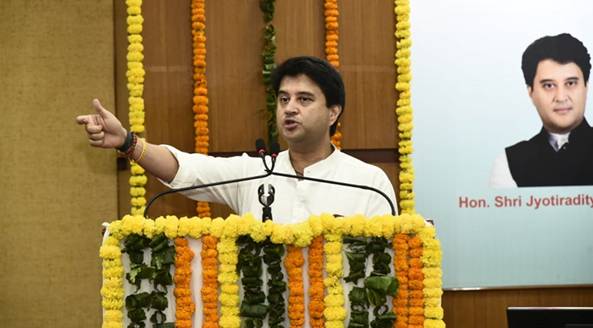India has taken a significant step to curb the rising menace of spoofed international calls with the launch of the ‘International Incoming Spoofed Calls Prevention System.’ This groundbreaking initiative, led by Union Minister of Communications, Jyotiraditya M. Scindia, is set to bolster the country’s defenses against a growing wave of telecom frauds that exploit unsuspecting individuals by disguising the origin of incoming calls. This system aims to not only protect Indian citizens but also strengthen the telecom infrastructure’s security and reliability.
The Rising Threat of Spoofed Calls
Spoofed calls are fraudulent attempts where the caller hides or disguises the origin of the call, making it appear as if it is coming from a trusted source. These calls are often used by scammers to deceive individuals into sharing sensitive information or making payments under false pretenses. Over recent years, spoofed calls have evolved into a global issue, with many international fraudsters targeting countries like India, where the sheer volume of calls makes detection challenging.
- Common Spoofs and Scams:
- IRS/Tax Fraud Calls: Fraudsters claim to be officials from tax departments, threatening legal action unless a fine is paid immediately.
- Tech Support Scams: Victims are told that their computers are infected with malware and are asked to pay for fake antivirus services.
- Banking and Insurance Fraud: Callers impersonate banks or insurance companies, asking for account details or OTPs under the guise of resolving fake issues.
- Lottery or Prize Scams: Callers inform victims of winning a non-existent lottery, but a “processing fee” is required to claim the prize.
These are just a few examples, and the nature of these scams keeps evolving, making the need for preventive measures even more critical.
The Scope of the Problem
Telecom fraud, particularly through spoofed international calls, has surged in India in recent years. According to reports, India witnesses millions of spoofed calls annually, many of which are aimed at defrauding individuals, businesses, and financial institutions. Fraudsters leverage techniques like caller ID manipulation to make their scams appear legitimate. This can lead to significant financial losses for both individuals and companies, along with trust erosion in telecom networks.
In 2023 alone, India saw a 30% increase in telecom fraud cases, with a substantial portion of these cases involving international spoofed calls. The loss incurred through these frauds is estimated to be in the billions of rupees annually. Globally, telecom fraud is a multi-billion-dollar problem, with India being one of the primary targets due to its large population and rapidly expanding digital infrastructure.
How the International Incoming Spoofed Calls Prevention System Works
The newly launched system aims to detect and block spoofed international calls before they reach end users. The prevention system leverages advanced technologies such as AI and real-time analytics to monitor and filter incoming international calls. Calls identified as spoofed or suspected to be fraudulent are immediately flagged and blocked from being completed.
- AI-Powered Detection: The system uses AI algorithms to analyze call patterns, detect anomalies, and flag numbers that are likely to be spoofed. It compares call data with international databases of known fraudsters and scam patterns.
- Real-Time Tracking: With real-time call monitoring, the system ensures immediate action is taken to prevent suspicious calls from reaching Indian consumers.
- Collaboration with Global Networks: The project also includes collaboration with international telecom networks and agencies to share intelligence on fraudsters, enabling quicker identification of new scam trends.
Why This Project Is Critical for India
- Protecting Citizens from Financial Loss: The most obvious benefit is safeguarding the public from the financial losses incurred through fraudulent international calls. Many victims of such calls lose significant amounts of money, either through direct payments or by having their financial accounts compromised.
- Securing Telecom Infrastructure: The prevention system strengthens the security of India’s telecom infrastructure. With fraudsters targeting weak points in telecom networks, implementing this system will ensure that India’s communication backbone remains secure and trustworthy.
- Restoring Public Trust in Telecom Services: Frequent occurrences of spoofed calls have eroded public trust in telecommunication services, especially when it comes to answering calls from unknown numbers. The success of this project can restore confidence in telecom services, encouraging more engagement and safer communication.
- Strengthening India’s Global Digital Footprint: As India continues its rapid digital expansion, being seen as a leader in telecom security measures will enhance its reputation on the global stage. This could also serve as a model for other countries facing similar challenges.
Conclusion: A Game-Changing Move in the Fight Against Telecom Fraud
The launch of the ‘International Incoming Spoofed Calls Prevention System’ represents a bold and much-needed step by India in tackling the growing menace of spoofed calls and telecom fraud. By harnessing advanced technology, real-time analytics, and global collaboration, this system is set to protect millions of Indian telecom users from scams and secure the integrity of the nation’s digital infrastructure. With this initiative, India is once again demonstrating its commitment to being at the forefront of tech-driven public security solutions.
As cybercrime and fraudsters become more sophisticated, the importance of such preventive systems cannot be overstated. While this project will undoubtedly enhance the safety of Indian telecom services, continuous updates and international cooperation will be key to maintaining its effectiveness in the face of ever-evolving threats.




